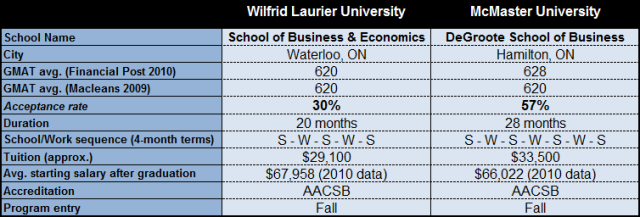Hey guys,
I thought I’d share my personal GMAT experience with everyone. This is not meant to serve as a study guide or to encourage anyone to follow my preparation strategy.
These days, writing the GMAT is a requirement for just about every top business school. It may seem strange, but I was glad that it was a requirement and was pretty excited to write it. I know that most people dislike standardized tests but I felt that this was a chance for me to challenge myself. I also liked the fact that everyone who wrote it was on a level playing field so that comparison among different applicant’s GMAT scores was a fair reflection of their performance. This was different than, for example, comparing GPA’s among different applicants. The GPA’s can vary from one university to the next and it may very well be the case that it is easier to get a higher GPA from one university than from another.
Anyways, I was pretty pumped to write the GMAT and wanted to get started right away. However, before I started studying seriously, I looked at the types of questions and gaged the difficulty of the exam to get a better feel for what I was in for. I had to make the decision of whether to study by myself or to sign up for one of those GMAT preparatory courses (i.e. Kaplan, Princeton, Oxford Seminars, etc.). I considered the pros of signing up for these courses. Some of the benefits included access to people who were very familiar with all aspects of the exam, reinforcement of study habits by having a study schedule and by being around others who were studying hard, and also meeting others who were writing the exam so that I could form a study group. I thought about it, but due to a few reasons, I decided that I wasn’t going to sign up. One of the big reasons was the cost of the courses. I felt that I could study by myself and achieve the results that I needed on my own.
 After deciding to study on my own, I set up a schedule for myself. I booked the exam for the next Monday, one week away. Now, this may seem like a really short period of time to study, and it probably is, but I do well under pressure. It really depends on the type of person you are and your comfort level with the exam format, the different types of questions, and your prior knowledge. To get a quick opinion on how long you should study for the GMAT, click here. Also, click here to view some data on the number of hours of preparation others have done in the past. So after booking the test I hurried off to the nearest Chapters and bought myself a good prep book with lots of practice questions. I bought The Official Guide for GMAT Review, 12th Edition since it was written by the creators of GMAT and also because it included over 800 practice questions. More than enough for me!
After deciding to study on my own, I set up a schedule for myself. I booked the exam for the next Monday, one week away. Now, this may seem like a really short period of time to study, and it probably is, but I do well under pressure. It really depends on the type of person you are and your comfort level with the exam format, the different types of questions, and your prior knowledge. To get a quick opinion on how long you should study for the GMAT, click here. Also, click here to view some data on the number of hours of preparation others have done in the past. So after booking the test I hurried off to the nearest Chapters and bought myself a good prep book with lots of practice questions. I bought The Official Guide for GMAT Review, 12th Edition since it was written by the creators of GMAT and also because it included over 800 practice questions. More than enough for me!
After one week of intense studying, I was on my way to the GMAT exam centre. The exam is offered pretty much every weekday of the year and in many different locations. I wrote mine in Ottawa and had the flexibility to choose from 3-4 different time slots. I thought it was pretty cool that I didn’t have to plan my study schedule to the constraints of the exam offerings since the exam was offered throughout the year.
Another cool thing is that you get the results of the exam right away since it is a CAT (Computer-Adaptive Test) and it calculates your score on the spot. As soon as I finished my exam the score was reported on the computer screen and I was excited! I was stoked that I had achieved the score that I needed and was glad that one week of intense studying was enough. Before leaving the exam centre, I received a printed copy of my unofficial GMAT test results. The official GMAT results take some time to be emailed and also note that it takes a really long time for them to mail a paper copy of the official GMAT report. All in all, I had a positive GMAT experience and had completed a critical step towards my applications to MBA programs.

